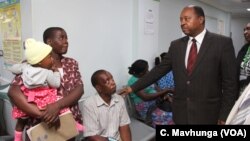A strike by Zimbabwean medical doctors is in its third day, with the government refusing to give in to their demands to be paid in foreign currency.
The doctors have been striking since Monday. They want to be paid in foreign currency, not the local currency known as bond notes, because that has been losing value.
“We don’t want to lie to each other or waste each other’s time,” said Health Minister Obadiah Moyo in response to the doctors’ demands. “We all know that there is no foreign currency to even buy the medicines, which they use in hospitals, let alone foreign currency to be paid to individuals.”
As the two sides bicker, a woman cries at Zimbabwe’s Parirenyatwa Hospital after the death of her mother-in-law.
The woman says her mother-in-law hadn’t been attended to since Tuesday afternoon, after she was involved in an accident.
Patients continue to be turned away because of the doctors’ strike, says Rumbidzai Matya a 60-year-old high blood pressure patient.
“We were supposed to have blood tests,” he said, “but they turned us down saying doctors are on strike and we cannot get that done as my blood might go bad before the strike ends.”
A few lucky ones have been helped, said one patient who refused to be identified.
“We were attended to; we saw our doctor and we had X-ray scans. There are other patients who are affected by the situation who were turned and were told to rebook,” she said.
For years, Zimbabwe’s health sector has been hurting as much as the country’s economy.
Medical services have been largely funded by Western organizations, such as the USAID and the European Union. Medical staff have gone on strike multiple times, demanding that their workplaces be equipped with modern technology and adequate medicines.
The opposition Movement for Democratic Change on Wednesday urged the government to meet the doctors’ demands.
In a statement, it said the strike is a clear sign of failure for the government.





